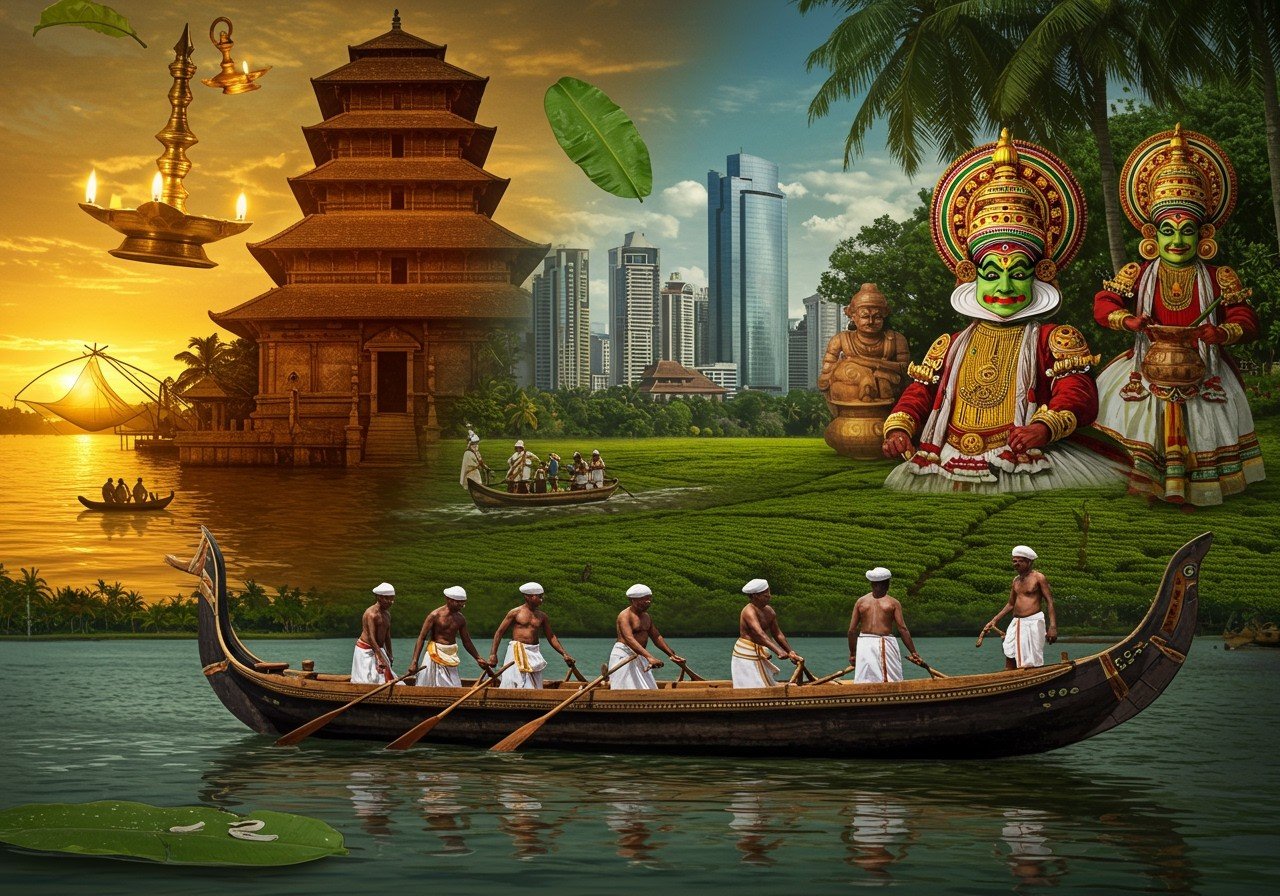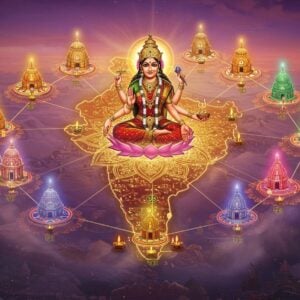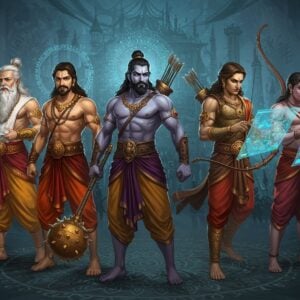
Kerala, fondly known as “God’s Own Country,” holds a unique place in India’s vibrant tapestry of cultures. Its history is a captivating narrative of ancient traditions, lively trade, and the enduring spirit of its people. From the bustling ports of antiquity to the serene backwaters of today, Kerala’s journey through time reveals a land shaped by resilience and adaptability. Let’s embark on an exploration of this fascinating historical narrative, tracing its key milestones and cultural shifts, and understanding the profound influence of religion and commerce in molding its identity.
Kerala’s Ancient Roots: Where History Unfolds
Kerala’s story begins in the mists of prehistory. Archaeological treasures unearthed in the Edakkal Caves offer glimpses into early human settlements, providing a window into life as it was millennia ago. As the Neolithic period dawned, agrarian communities blossomed, cultivating the land with rudimentary tools and laying the foundation for a thriving agricultural society. Muziris, an ancient port city, stands as a symbol of Kerala’s early prominence in global trade. This bustling hub connected Kerala with the Roman, Egyptian, and Greek civilizations, showcasing its maritime prowess. During the Sangam period, Tamil literature flourished, adding a rich layer of storytelling and cultural exchange to Kerala’s evolving narrative.
Medieval Kerala: A Fusion of Faiths and Dynasties
The medieval era witnessed the rise of powerful dynasties, including the Cheras, who unified the region and fostered trade and commerce. Before Hinduism gained widespread prominence, Jainism and Buddhism also left their mark on Kerala’s spiritual landscape. Magnificent temples arose, showcasing unique architectural styles that continue to inspire awe. The Zamorin of Calicut played a pivotal role in promoting trade and cultural exchange, further enriching Kerala’s vibrant cultural mosaic. The arrival of European explorers, notably Vasco da Gama in 1498, marked a turning point, introducing new influences that would reshape Kerala’s destiny.
For a serene spiritual experience, consider the Kusha Asan available at Poojn.in. Crafted with authentic Kusha grass using Vedic methods, it provides a comfortable and sacred space for your prayers and meditation.
Colonial Kerala: Navigating Change and Transformation
European colonization brought about significant changes in Kerala’s socio-political fabric. The Portuguese established trading posts along the Malabar Coast, followed by the Dutch and British, each leaving their imprint on the region’s economic and political systems. The introduction of Western education by missionaries sparked social reform movements, challenging existing norms and paving the way for a new era. Visionary leaders like Sree Narayana Guru and Ayyankali emerged as champions of social equality, fearlessly fighting against caste discrimination and inspiring transformative changes in Kerala’s society.
Post-Independence Kerala: Shaping a New Identity
Following India’s independence in 1947, Kerala embarked on a journey of self-discovery. The year 1956 witnessed the unification of Malabar, Travancore, and Cochin, giving birth to the state of Kerala as we know it today. Political developments, including communist movements and land reforms, shaped Kerala into a model for social welfare and progressive policies. Kerala achieved remarkable progress in literacy, healthcare, and gender equality, setting an example for other states. However, challenges such as economic dependence on remittances and environmental concerns remained, demanding attention and innovative solutions.
Modern Kerala: Embracing Progress and Tradition
Today, Kerala stands as a vibrant blend of tradition and modernity. Its tourism industry flourishes, showcasing the state’s breathtaking natural beauty, colorful festivals, and rich cultural heritage. The IT sector and entrepreneurship have emerged as drivers of economic growth, contributing to Kerala’s dynamic and evolving economy. Moreover, Kerala has taken a leading role in sustainable development, championing organic farming practices and promoting renewable energy projects. Kerala’s unique political landscape continues to influence national policy-making, reflecting its independent spirit and commitment to social justice. Throughout its journey, Kerala has demonstrated remarkable resilience and adaptability, each era adding a new layer to its rich and multifaceted identity.
At Poojn.in, we offer a wide range of puja items to enhance your spiritual practices. From incense sticks like the Cycle Rhythm Sandal to pure cotton sarees like the Suti Saree for offerings, you’ll find everything you need for a fulfilling puja experience.
Kerala’s Puja Traditions: A Connection to the Divine
Kerala’s rich cultural heritage is deeply intertwined with its unique puja traditions. Poojn.in is proud to offer a selection of authentic Kerala puja items, allowing you to connect with the divine in a truly traditional way. The Nilathodu (നിലത്തോടു), also known as Pure Raw Nil/Neal powder, is a natural blue dye used in various Kerala rituals. You can find this special powder and other traditional items like brass lamps and puja utensils on our website. Poojn.in delivers across India, ensuring that devotees everywhere have access to these culturally significant items.
For specific rituals, Poojn.in offers items like Kakkal fruit, Pancha Kasai, and Kalwa Raksha Sutra, ensuring you have everything you need for a traditional Kerala puja.
Delving Deeper: FAQs about Kerala’s History
Many are curious about the nuances of Kerala’s past. Some wonder about the origins of its name, believed to be derived from “Kera,” meaning coconut tree, a ubiquitous presence in the region. Others are interested in the major historical influences that shaped Kerala, including the Portuguese, Dutch, and British, whose presence is still reflected in its architecture, cuisine, and artistic expressions. The impact of the spice trade, with Kerala’s Malabar Coast serving as a hub for pepper, cardamom, and cinnamon, is another intriguing aspect of its history. The evolution of modern Kerala from its ancient roots is a story of adaptation and transformation, blending ancient traditions with modern advancements. To truly appreciate Kerala’s diverse culture and contributions to art, literature, and science, understanding its history is paramount. Numerous books and online resources offer detailed accounts of Kerala’s past, providing valuable insights for those seeking a deeper understanding.
A Glimpse into Kerala’s Historical Timeline
- Early Mentions (3rd Century BCE): Kerala’s earliest mention as Keralaputra appears in a rock inscription by Mauryan emperor Ashoka, highlighting its existence as one of four independent kingdoms in southern India during his reign. This marks the beginning of Kerala’s recorded history, showcasing its early political significance.
- Ancient Period (Pre-6th Century CE): As part of Tamilakam, Kerala was governed by dynasties like the Pandyas, Cholas, and Cheras. Known to the Romans and Greeks for its valuable spices, the region also saw the arrival of Jewish immigrants in the 1st century CE, adding another layer to Kerala’s diverse cultural tapestry.
- Medieval Period (6th-18th Century CE): Arab traders introduced Islam between the 6th and 8th centuries, further enriching the religious landscape. Under the Kulashekhara dynasty (c. 800–1102), Malayalam emerged as a distinct language, and Hinduism gained prominence, shaping Kerala’s cultural identity.
- Arrival of Europeans (1498 CE): Vasco da Gama’s landing near Calicut in 1498 initiated European intervention, significantly impacting Kerala’s future. The Portuguese, Dutch, and British played important roles, leaving lasting influences on Kerala’s social, political, and economic structures.
- Formation of Kerala State (1956 CE): Following India’s independence in 1947, Travancore and Cochin merged. Subsequently, in 1956, the state of Kerala was formed by uniting Travancore-Cochin with the Malabar Coast and Kasargod taluk, marking a significant milestone in its modern history.
Kerala: Honoring the Past, Embracing the Future
Kerala’s history is a vibrant tapestry woven with threads of tradition, cultural exchange, and transformative eras. From the ancient port of Muziris to its modern-day advancements, Kerala has embraced progress while cherishing its roots. Each period, from prehistoric times to the present, has played a vital role in shaping the resilient and vibrant society we see today. As Kerala continues its journey, it carries the wisdom of its past, ensuring that its heritage flourishes alongside modern innovations. For those who value tradition and seek authentic experiences, Kerala offers a harmonious blend of the old and the new. Explore the beauty of its past and witness the promise of its future – a journey that invites you to discover the heart and soul of “God’s Own Country.”
Learn more about the fascinating history and significance of Kerala temples by visiting our blogs on Guruvayur Temple and Vaikom Mahadeva Temple. You can also explore the rich culinary traditions of Kerala with our blog on Kerala’s Sacred Foods.


